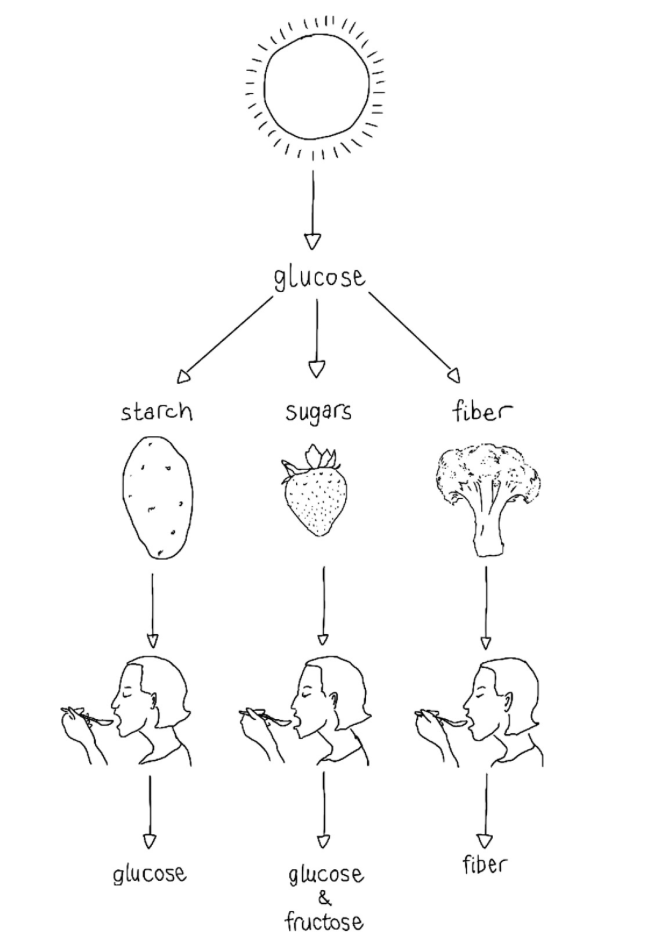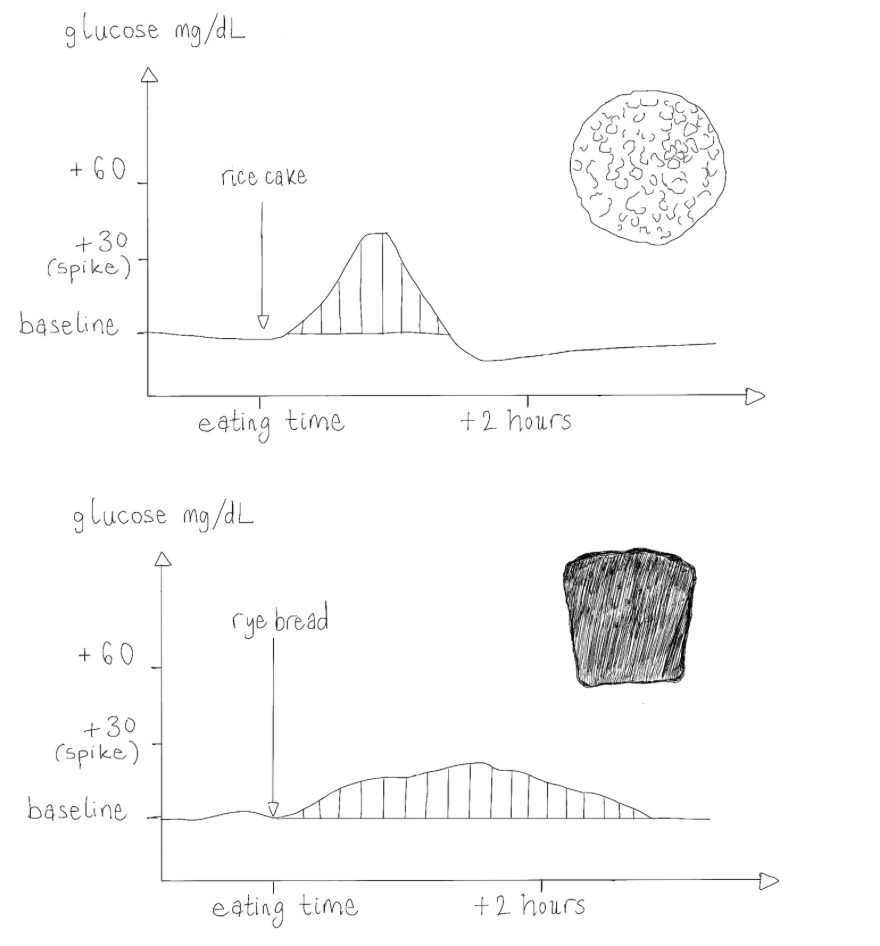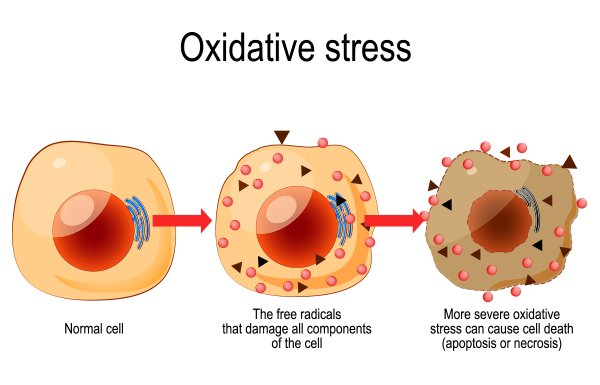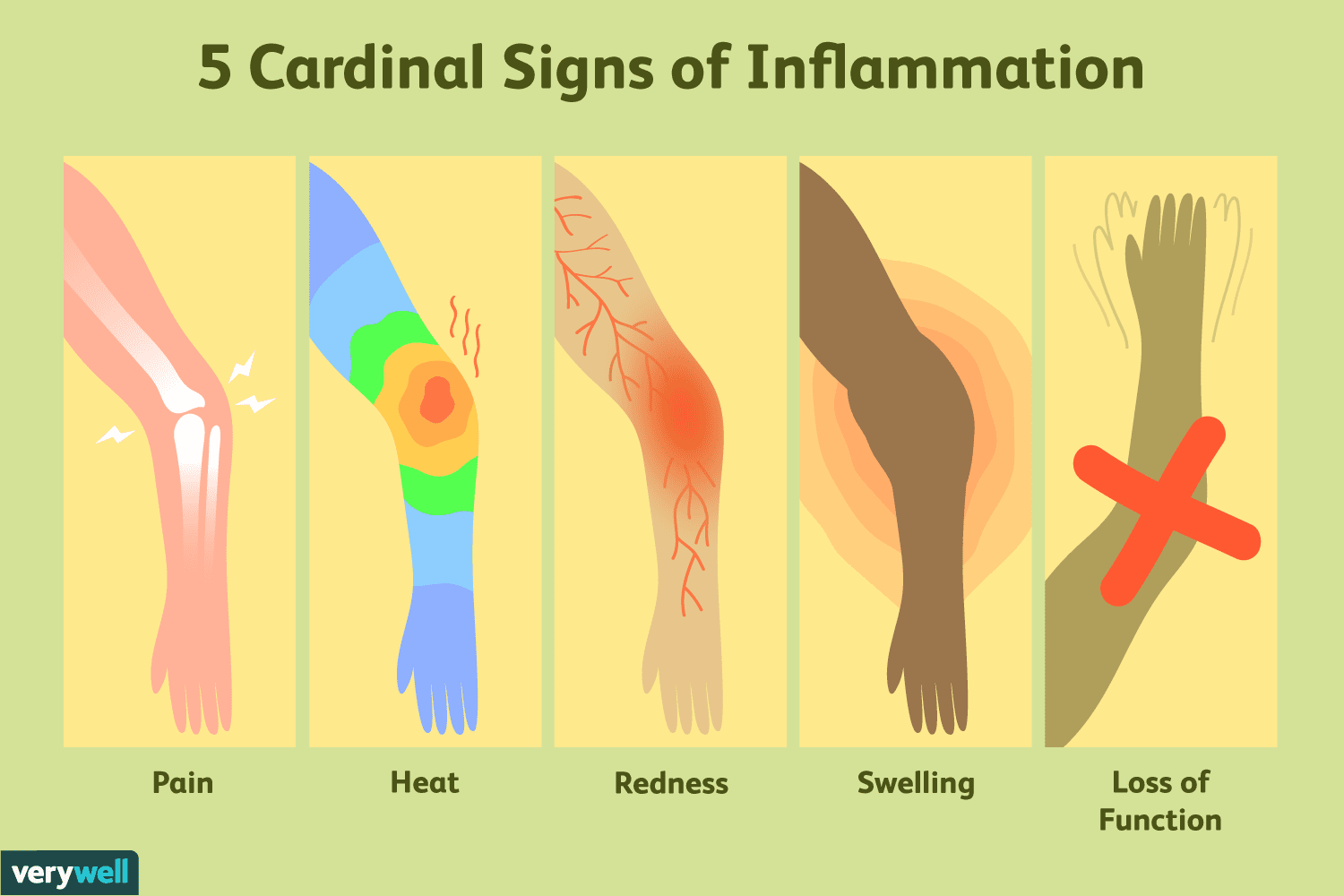Memory - Charan Ranganath in podcast with Lex Fridman
This Article is my notes from Fridman podcast, link: https://lexfridman.com/charan-ranganath
Charan Ranganath, Ph.D., is a Professor of Psychology at the University of California. His research focuses Memory, Cognitive Neuroscience, Neuroimaging, EEG, fMRI.
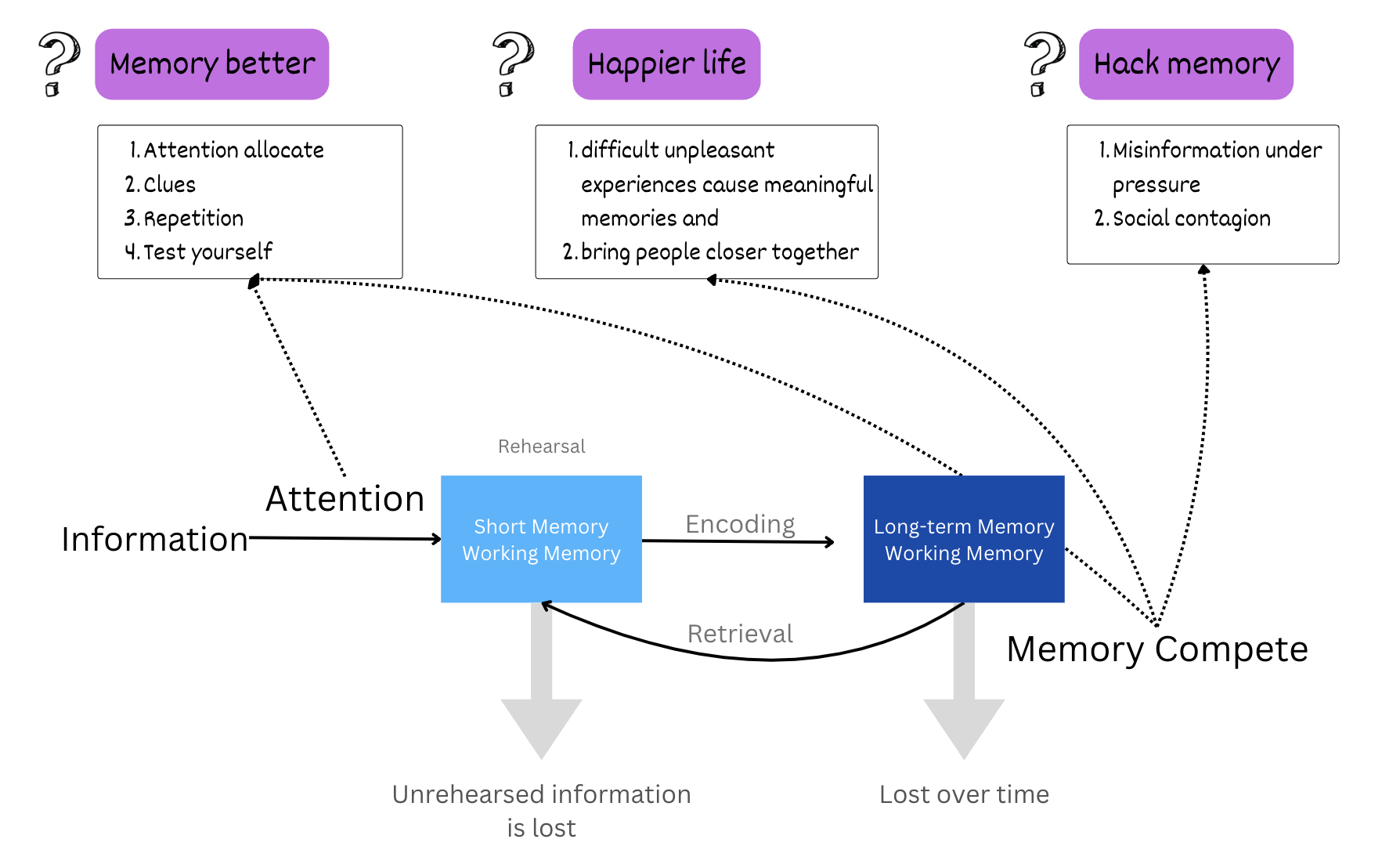
Remembering self
What we remember is not the record that we experienced. We remember the highlights, the best parts, and the bad parts. it's missing a lot of the details.
Our brain is optimized for learn what is most useful in the past and knowning the present and to predicting the future. We usually predict the future right, the bus which you take will not exploded, so you get a illusion that you know everything what will happen. When the illusion is broken, we find something error, that error is the key to learning. the error is where the learning happens.
Do things that are very unpleasant in the moment, because they can potentially provide meaningful memories, stories, or lessons that can be appreciated and enjoyed for many years afterward.
If you having shared difficult, unpleasant, or trying circumstances with other people. Those are the things that you remember the most, and make people feel closer to each other.
Why we don't look back enough? Because we often lack the confidence that they can successfully overcome or face the challenges that they have faced in the past. the actual capability to accomplish tasks or get things done in difficult moments is better than just believing that you can do it. The darker it gets, the better the story will be if you emerge on the other side.
Adolescence
Adolescence is much more important than many people realize. Teenage years are so important for the development of the brain.
People think parents consequential in forming child by making every decision. It does, but not all, children are also forming themselves.
children is learning how to get along with other people, learning who they are and how they function at the adolescent stage. that's more important than the content that children are learning in school. if they get an perfect parent working on them, that can be terribly traumatizing.
Why human don't remember much of the first few years of life?
- hippocampus taking some time to develop.
- neocortex is developing rapidly and changing.
- child's self-sense takes time to develop.
In the first few years of life, kid's internal model if changing rapidly. that is not a bad thing, actually, brain is very evolved to optimize for different stages of life. like prefrontal cortex which is helps us use our knowledge to archive our goals, its takes forever to develop.
- childhood, frontal cortex is massively reforming. as a child they wander around, they need to learn about the world the culture, the language, the people, the rules. they need to explore. they want to be free, they don't want to be tight, they didn't know what their goals are.
- young adult, 10 years prime functioning, because they have to hunt and forage, they need to raise child, they need stay focused on the big picture and the long term goals.
- older, going down and end up being losing all that frontal function. in our society, older is no longer responsible for hunting for studying, they are responsible for teaching, for guiding, to pass on the knowledge to the next generation.
Different types of memory
Episodic memory, semantic memory, working memory, short-term memory, long-term memory, what are the differences between them?
Researchers want to model things for experimental purposes, but in reality, they are all interconnected.
Working memory was coined by Alan Baddeley, its a short-term memory to keep and control the flow of that information in mind, to manipulate it, to use it, to make decisions based on it. we have the alibity that passively storing information, but what is more important is that we also have ability to control the flow of information that's being kept active based on what we are doing.
This working memory, some researchers call short-term memory, is not at all independent from long-term memory.
Working memory help us create internal models of events, help us predict, interpret, example: when you at a child's birthday party, when you just see a candle, you can predict the whole events that happens later. but to build that model, you need to retrieve the knowledge from the Semantic memory, and you need to retrieve the memories for specific events that happened in the past, that's Episodic memory.
How to improve memory
You don't want remember more, you want remember better. brain is designed to use the least amount of energy to get the less information. so if you want to remember everything, it's already failed. It's all about reusing information, making the most of what we already have.
When you are suprise, fear, stress, etc, your brain is realsing a lot of chemicals like norerpinephrine, dopamine, serotonin, those improve the priority of the information that you are processing, and help it memory better.
Attention is a big factor in memory. and attention is something that you can train. How we allocate our attention and how we hold attention on a thing is important. If you are an expert in something, you are training attention.
Memory Palace is a good technique, it's provide a structure for the information, give you the clues to retrieve the information.
Space repetition is another good technique, if you repeat the information over time, you can retain the information better. what behind this is memory is compete, if you remember this information in different times in different places, it's more accessible to you.
Test yourself, when you test fail, you get the error, you get the mismatch, that error is the key for our nerual network to learn. If you constantly pushing yourself to your limit, you will retain the information better. If you are feeling comfortable, you are not learning.
Find the error may let you feel uncomfortable, unconfident, lost hope, You may very very don't want to do it because of this fear, it's hard, but when you get over it, you will realize, that's the best way to learn.
Imagination and actual memory
where did the mental experience come form?
what is the diffrience between we remember something that is happen, and we thinking about something.
prefrontal cortex foucusing on the sensory information
we don't replay the past, we imagine how the past could have been by taking bits and pieces that come up in our heads.
imagination is fundamentally coupled with memory in both directions.
Memory sport example
A guy named Scott Hagwood, he has a cancer, he should treat it by chemo, but he afraid that chemo will badly affect his memory, so he want to train his memory skills. He buy a book, and practice it over and over again, and then he go to the memory competition, and win the bet.
The competition usually competition on the arbitary thing, like long list of numbers, words, or cards.
Navigation and memory
When rats puts in a box and chase the cheese, their cell in the hippocampus fire when in diffrence places in the box. So hippocampus forms a map of the box.
And our brain is effectively learning new things based on the old experiences. If you familiar with your local IKEA, you can easily know navigate in another IKEA. you can use the old map everywhere.
Rather than bascially mapping every coordinate in a space, the brain is form a graph of the space economically. It connects the major landmarks, important things, fill blanks with the details. It contains verifiable details and lots infrences.
Explain FMRI, how it measure brain activity
blood flow in the brain, blood didn't have oxygen on it, is magnetic than blood with oxygen. so we can use the magnetic to see the blood flow in the brain.
When we get a movie of the brain activity, we can observe the brain activity in different regions of the brain.
You can measure brain activity by FMRI after 6 seconds of the actual event. Because the blood flow is slow and so much back and forth in the brain.
Most of cells in the brain are not neurons, they are glial cells, they are supporting the neurons.
Major discoveries in memory
there is so many discoveries and hard to summarize, Charan mentioned a few:
- Our continuous experience is broken into discrete events and stored in memory.
- Study of how much we forget.
- Study of how expertise can memory so much things.
- Discovery of act remembering and change the memory. Strenthen the memory, or weaken the memory, or distort the memory by misinformation.
What is the similarity in humans and mice.
Human is not a big mouse, we got a lot of differences.
- sensory information is very different. rats explore the world largely by smell.
- we have language, and social structure.
How does deja vu work?
Deja vu is a experience of feeling like you have been in there before. experience this moment before.
Its artificial memory, mixed things fire together, make you feel like you have been there before.
Some times little distortion in filling the blanks in the memory.
If a person think he has a cancer, and he see a doctor, the doctor say things is as your expect. the person will remember the doctor say he has a cancer, but the doctor didn't say that.
The act of remembering can change the memory. if you remember something, and I told you something about the thing you remember, and then somethimes you might remember the original thing and mix it with the new thing I told you.
Social contagion is misinformation spread like a virus. we remember same thing, but I give you a little bit of wrong information, that information become your story of what happened. You and I share memory, I tell you the experience, you tell me the experience, we share the memory, and that become Our memory. The more you trust that person, or the more powerful that person is, the more they can influence your memory.
False memory implant example: During McCain vs. Bush Jr. primary, a poll asked voters: "if they'd still support McCain if he had an illegitimate black child". Many remembered this false info, and McCain lost the election.
People's sense of collective identity is very tied to shared memories. if we have a shared past, we will feel more socially connected. When some people weponize the history, that's scary.
When a group have people who are very dominant, group remembers less from the past, remember more of what the dominant person said.
When a group have a diverse group of people, and give everyone a chance to speak and everyone
s being appreciated for their unique contribution, we can get more accurate memory and get more information. but that's require tolerance for discomfort, it's hard especially when we are tired, stressed.
Constant state of wanting
When you get a paycheck every month from your job, you wouldn't get excited about it. That adaptation is a major way connected to strive and not be happy. We are designed to be constantly wanting.
Dopamine is not a pleasure chemical, it's discomfort that energizes you to seek a reward. You can both use the dopamine to motivate you to do things, or you can study this discomfort and tell yourself that you don't want to hear it, its disgrees with your beliefs.
Torture can make people remember anything
CIA, and other justice department, has long history let people say that they want to hear, not necessarily the truth through torture. Their is serval reasons:
- People get tired of being tortured, they just say whatever.
- They set a authority figure, keep pressure and keep telling the person he is do this, and the person start to question himself. People in weakened mental state and be guided to remember the false memory.
Heartbreak
Memory is designed to capture things that biologically significant, and relationship is a big part. Sometimes heartbreak comes with massive changes in your beliefs about somebody or regret about what you did.
Lost not only comes from the relationship is over, but also from all the good things. You can change the perspective and grow to new ways.
Feeling of time
Mermory does weird things to time, if you think now and one hour ago, you may sense many differences. But if you think one year ago and one year and a hour ago, you may feel like it's the same time.
During the pandemic, people feel days are long, but weeks are short. Because people are doing the same thing at the same context. nothing is changing, memory is little, so they feel time is short in the long term.
That is because memory shapes our sense of time, and context is so important for memory.
Nostalgia
Felipe de Burgarde, think of nostalgia as a disease, because it bringing people extraordianry unhappiness. But when people get older, nostalgia can be an enormous source of happiness, but it may has the opposite effect if you thinking old days are better than now, and it's over.
Brain computer interface
BCI is developing very interesting techonology like surgical robots. And it has lots of innovation in the future.
Can we modify memory?
In some sense, we can do it behaviorally. like giving pressure, giving misinformation, etc.
But we didn't know what is the memory, Memory is so complicated.
LLM
Social system is complex, like a intersection, every intersection has its own personality, In Boston vs New York vs rural town they are all diffrerent. people are behave dynamically.
What LLM do to solve the problem is to collect a huge amount of data, they don't understand human behavior and what they think, but they can represent how people cross streets.
attention is the core to be intelligent.
Connection between ADHD and memory
Charan is been told he has ADHD, ADHD is associated with differences in preforntal funciton. Attention is shift easily, memory tends to be poor.
People with ADHD often have great memory for the things that they're interested in, and poor memory for the things that they're not interested in.
How to learn, remember things better
Be a science is enormously enabling of ADHD, you're constantly looking for new things, you're constantly seeking dopamine hit, and people tolerate your late for things. You can freely follow your curiosity.
Structure activities is important, you should learn how to allocate attention. set event boundaries, avoid switch, and goofing time is not wasting time, its an investment for attention.
Multitasking is very bad for memory, according Melina Uncapher's research.
Cal Newport wrote a book called "Deep Work", it's about how to foucs and how to allocate attention.
How Charan become a musician
Charan play trumpet in school, and he start to play guitar, but he just can't got it. it's different from trumpet, he got a lot time to practice, but it's now work.
Since Charan saw bands like Sonic Youth, it blew his mind, he was struggling because he try to write popular music at the time, and what sounded like other bands. he didn't enjoy try to play stuff that other people play.
So he start play what he like, didn't follow others style, and explore the possibilities of different sounds. it's actually fun, the whold world opened up to him.
What Charan like most about human mind
The idea of the internal model, every thing you see, you touch, is connected by internal model.
People needed to hear from scientists, and people didn't get the uncertainty of science and how much we don't know. So he write this book.
difficult unpleasant experiences cause meaningful memories and





